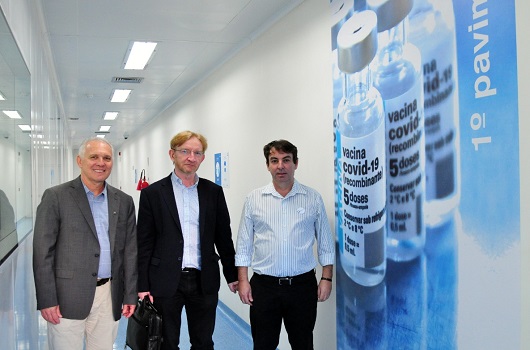Researcher who developed Oxford/Astrazeneca vaccine is honored at Fiocruz
09/05/2022
Ciro Oiticica (Fiocruz News Agency)
On April 26, Fiocruz received a visit from the director of the Jenner Institute, University of Oxford, Adrian Hill. Within the scope of the Foundation's Deliberative Council, he was given a plaque in gratitude to him and his university team for the development of the Oxford/Astrazeneca vaccine, today produced 100% nationally at the Institute of Technology in Immunobiological (Bio-Manguinhos/ Fiocruz), after technology transfer. Then, the researcher visited the COVID-19 vaccine production plant at the Henrique Penna Center and the Final Processing Center.
Hill was personally received by the vice president of Research and Biological Collections, Rodrigo Correa, by the director of Bio-Manguinhos, Maurício Zuma, by the senior scientific advisor of Bio-Manguinhos, Akira Homma, by the manager of the Viral Vaccines Program at Bio-Manguinhos, Elena Caride, and by the director of the Institute of Science and Technology in Biomodels (ICTB/Fiocruz), Cristoph Milewski. He was accompanied by a researcher from the Oswaldo Cruz Institute (IOC/Fiocruz) Leonardo Carvalho, one of the organizers of the Symposium on Emerging and Persisting Global Health Threats and XVI National Malaria Research Meeting (RNPM) - both events took place in Rio de Janeiro and with Adrian Hill's participation as a speaker.
Zuma and Carvalho received Hill (center) at Fiocruz (Image: Pedro Paulo Gonçalves)
Vice President Rodrigo Correa thanked Hill and his team for their dedicated work in developing the vaccine, as well as the presence of the Advisory Board members. “Fiocruz considers what was an achievement of great importance for all of us and its presence shows the relevance of this joint work between Oxford, Fiocruz and Bio-Manguinhos.” Correa designed future partnerships: “Vaccine development research can count on the large number of highly qualified Fiocruz researchers. There are opportunities for both institutions with regard to the prevention and treatment of different diseases. We have a lot to exchange and learn together,” he guaranteed.
Adrian Hill said it was a pleasure to be at Fiocruz and highlighted the partnership. “We need people to co-develop vaccines and other products, and the result is good for everyone.” He highlighted Brazil's role in the pandemic, as it was one of the countries where clinical trials were carried out very quickly, with many volunteers. “We also learned a lot from the speed of vaccine production here in Bio-Manguinhos,” he added. “We also need to think about responding to possible new emergencies, about new models and designs for vaccine development.” In this sense, partners with great production capacity would be essential to fill the gaps in the performance of pharmaceutical companies, not always interested in research and production of products for certain diseases, notably, the neglected ones.
The Institute's director, Maurício Zuma, valued the process of technology transfer between Fiocruz, Oxford and Astrazeneca. “Thanks to it, we were able to produce and deliver more than 166 million doses from March 2021 to March 2022. A really important partnership for our society. We are open to discussing future collaborations,” he said. In addition to the production capacity of Bio-Manguinhos, Zuma valued the unit's expertise in improving vaccines and absorbing technology from large pharmaceutical companies.
The latest advances in vaccine research have sparked the interest of Bio-Manguinhos' senior scientific advisor, Akira Homma. After recalling that Bio-Manguinhos improved the yellow fever vaccine, the vaccine specialist pointed out the challenge of combining different immunizing agents in the same application. “There are so many vaccines on the vaccine schedule, it's hard to get people to get so many,” Homma explained. “In the future, it is necessary to combine to have fewer interventions, applications. And the adenovirus platform could help achieve that goal,” he said.
At the end of the meeting, Hill joined Professor Homma's optimistic tone. "It's an exciting time for vaccine research, with a lot of progress being made at an accelerated pace, a rejuvenation of research." And he celebrated the recognition that science itself has been acquiring in society. “Science is becoming more appreciated. I remember a t-shirt that said, 'Forget being a princess, I want to be a scientist!'



